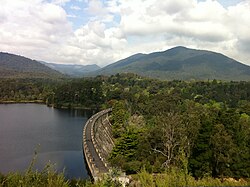Maroondah Dam
 From Wikipedia the free encyclopedia
From Wikipedia the free encyclopedia
| Maroondah Dam | |
|---|---|
 Maroondah Dam at capacity, October 2011 | |
Location of the Maroondah Dam in Victoria | |
| Country | Australia |
| Location | near Healesville Victoria |
| Coordinates | 37°38′07″S 145°34′04″E / 37.63528°S 145.56778°E |
| Purpose | Potable water supply |
| Status | Operational |
| Construction began | October 1920 |
| Opening date | 1927 |
| Operator(s) | Melbourne Water |
| Dam and spillways | |
| Type of dam | Cyclopean concrete gravity dam |
| Impounds | Watts River |
| Height | 41 m (135 ft) |
| Length | 291 m (955 ft) |
| Dam volume | 132,000 m3 (4.7 million cu ft) |
| Spillway type | Uncontrolled concrete ogee-shaped overflow weir with rock channel chute |
| Spillway capacity | 465 m3/s (16,400 cu ft/s) |
| Reservoir | |
| Creates | Maroondah Reservoir |
| Total capacity | 22,179 ML (783.2 million cu ft) |
| Catchment area | 10,400 ha (26,000 acres) |
| Surface area | 200 ha (490 acres) |
| Website Maroondah Reservoir at Melbourne Water | |
| [1] | |
The Maroondah Dam is a rock-foundation concrete gravity dam with an uncontrolled rock-chute spillway across the Watts River, located in the Central region of the Australian state of Victoria. The storage created by the dam is called Maroondah Reservoir. The principal purpose of the dam and its reservoir is to supply potable water for Greater Metropolitan Melbourne.[2]
Location and features
[edit]
Constructed in the 1920s by the Melbourne and Metropolitan Board of Works, it is now operated by Melbourne Water.[3] Like most of Melbourne's water harvesting reservoirs, the entire catchment is eucalypt forest completely closed to human activity, as is the reservoir itself. Immediately below the concrete dam, the Maroondah Reservoir Park[4] features a large garden landscaped in an "English style", featuring many exotic plants very different from the surrounding native vegetation. A walking track leads across the dam, over the spillway, and up to a lookout from which much of the reservoir can be viewed.
History
[edit]Following the Yan Yean and Toorourrong schemes, the Maroondah Dam scheme was the third water supply source for Melbourne. The Maroondah Aqueduct was built in 1886–1881 to supply water to the Preston Reservoir from a diversion weir on the Watts River. The level of the aqueduct was determined by the site of the proposed Maroondah Reservoir, preparatory work for which was undertaken in 1915–1919. Construction commenced in October 1920 and was completed in 1927. During that period, the capacity of the Maroondah Aqueduct was increased.[3]
In 1986, the reservoir spillway was widened to increase its flow capacity to that of a 1-in-10,000-year flood and, in 1989, the stability of the concrete dam was enhanced using ground anchors.[1]
See also
[edit]References
[edit]- ^ a b "Register of Large Dams in Australia". Dams information. The Australian National Committee on Large Dams Incorporated. 2010. Archived from the original (Excel (requires download)) on 12 December 2013. Retrieved 4 March 2014.
- ^ "Maroondah Reservoir". Supply water: Water storage reservoirs. Melbourne Water. Retrieved 9 March 2014.
- ^ a b Ritchie, E. G. (October 1934). "Melbourne's Water Supply Undertaking" (PDF). Journal of Institution of Engineers Australia. 6: 379–382. Archived from the original (PDF) on 18 February 2011.
- ^ "Maroondah Reservoir Park: Park Notes" (PDF). Parks Victoria. Government of Victoria. August 2004. Retrieved 27 November 2011.
